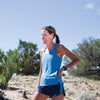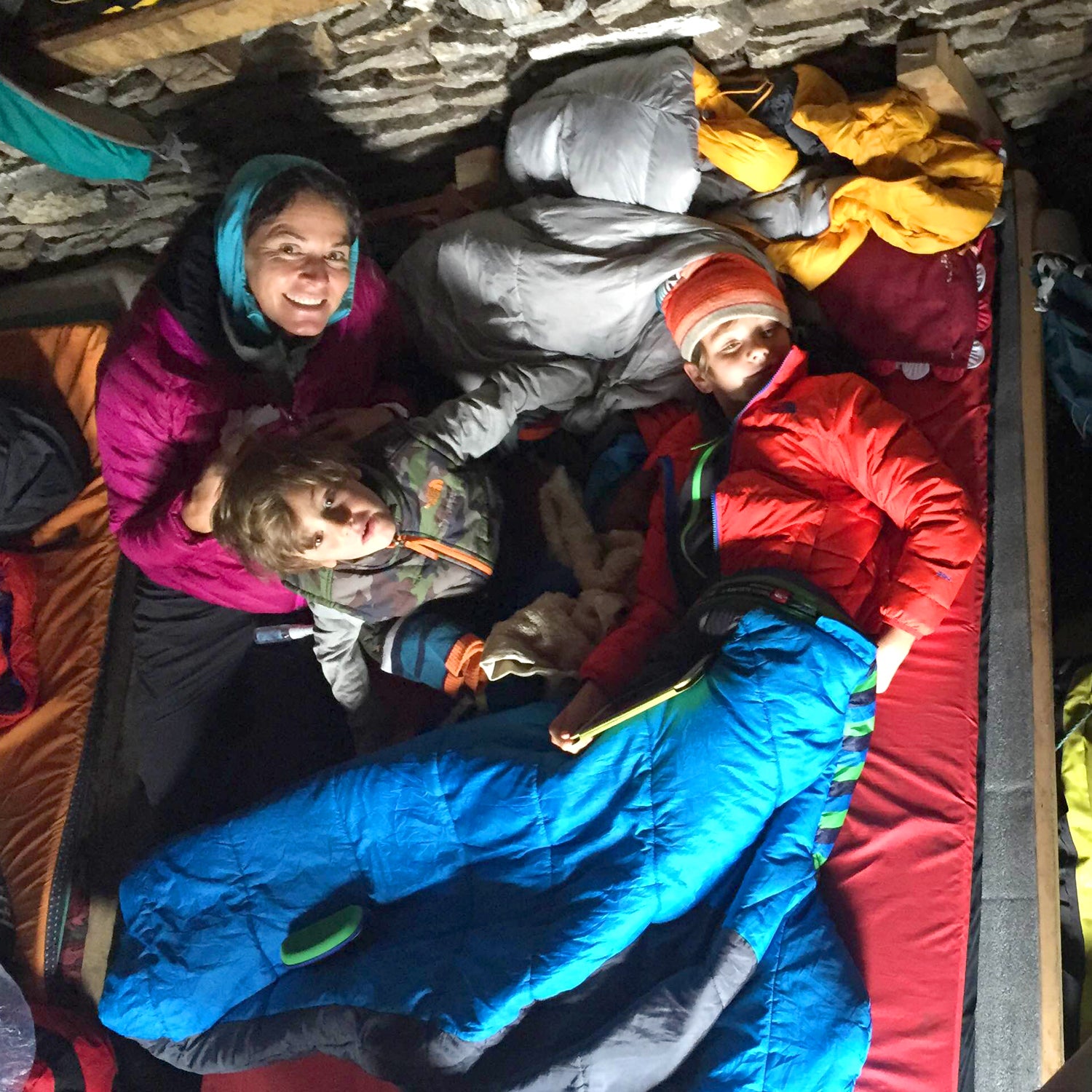Hilaree O’Neill is used to long goodbyes. The 42-year-old mountaineer travels for months at a time, climbing and skiing some of the world’s highest peaks. In 2012, she became the first woman to summit two 8,000-meter peaks in 24 hours—an impressive blitz that took her away from home and her two young sons for three months. Last year, she endured a brutal slog through the jungles of Myanmar .��
For O’Neill’s latest expedition, a ten-week mission to Nepal this month to climb and ski 27,765-foot Makalu, she brought along her two sons, six-year-old Grayden and eight-year-old Quinn, and her husband, Brian, for the eight-day trek through Makalu Valley to base camp. Consider it an extreme example of Take Your Kids To Work Day. After arriving at base camp, Brian and the boys set off to catch a helicopter flight to Kathmandu and then a flight home to Telluride, Colorado. O'Neill stayed behind to acclimatize for her journey to the Makalu summit.
Three years after I talked to O’Neill about mothering from Mount Everest, I caught up with her again by satellite phone, this time from Makalu’s advanced base camp at 18,700 feet. The boys are older now—old enough to accompany their mom on a multiday mountain trek—and they have a clearer understanding of what their mother does for a living. “They're so supportive and excited for me,” O’Neill said.��But saying goodbye to them—even from base camp—never gets any easier.
��
Over a patchy connection, we talked about adventure parenting, the highs and lows of high-altitude hiking with kids in tow, and how she stays focused for what she hopes will be a first ski descent of Makalu. O’Neill’s five-person team is the only one on the mountain, and she and her fellow mountaineers are on��track to summit, with skis and without oxygen, by the end of September.
OUTSIDE: What was your trek in to basecamp like with the boys?
O’NEILL: I think it's been the hardest part of trip for sure. I’ve always fantasized about them coming to Nepal with me, this place I love so much. And my husband has never been into the Himalaya, either. I didn't realize how hard trekking in would be during the monsoon season. It was super wet with lots of leaches. Some of the river crossings were really dangerous, and the boys were wet the whole time. My older son got sick and had to be on antibiotics. We had it set up that we could pull the plug if we needed to [by calling in a helicopter rescue], but the weather was so bad, we couldn’t have gotten a helicopter in if we'd wanted to. So they just suffered through, and I’m way proud of them.
Sometimes in parenting, I’ve found that the things you think will be hard are easy and the things you think will be easy turn out to be hard. Was that the case with this trip?
Definitely. I thought it would be difficult to motivate the kids to do hiking. When I’m home I can't even get them to hike for 45 minutes with me. But that was actually the easiest part. They were rushing out the door each day. They wanted to be first. They totally stepped up—we covered maybe five to eight miles a day, and they went from 3,000 feet to 16,000 feet. The hard part was keeping them healthy, and it was a lot harder than I anticipated, with the weather and the bugs.
��
There’s some debate over high altitude being hard on kids’ lungs. Did they have any trouble?
We live at 9,000 feet [in Telluride] and they spend a lot of time up high, especially in winter. I took them to Kilimanjaro in 2014, and they went up to over 14,000 feet. They did great.
Once you made it to base camp, Brian and the boys hiked out. How was the goodbye?
I had intensely mixed emotions, which is a lot like parenting, I guess. I really didn't want them to leave, but at the same time, I had to start this objective at some point and they couldn’t go any farther. It's too hard.
After I watched them walk away, I hiked up to 18,500 feet, alone. I had to avoid the panic and burn off some of that emotional energy. Afterwards, I felt better for a couple reasons. I had been really sick at base camp and wasn't sure if I'd be able to get up to advanced base camp (ABC), so then I knew I could do it. I ended up being able to hike up to ABC by myself, which was the best thing I could have done. Not to sound corny, but it was important for me to take the time to transform. It was a technical hike, too, so it really required attention. It was the day my kids flew out, and I was feeling anxious if they made it. It was a good way to get emotions out of me and get ready for the climb.��
How much do they understand about the risks of what you’re doing?
Not very much, and part of that comes from me. I don't talk about the specifics of the trip with them. I did talk to them about climbing without oxygen, but they don’t understand the greater risk of that. They understand the purity of it and how I like to push myself.��
��
How difficult is the climbing?
So far, up to camp two it's not so technical. From camp two to camp three, it's going to be the hardest high mountain day.��There's a big beautiful couloir that could avalanche. You climb up rock and snow. It’s steep and very committing. Then you ski down the couloir.
When you were on Everest, you talked about the guilt you feel over being gone. Do you still feel that way?
Oh, it's still there, for sure. The hardest part of this whole thing is my husband going home and diving into the kids’ school year without me there to smooth the entry. I messed up the soccer schedule, so that's what I've been dealing with from camp one. I can't believe I'm dealing with that! It’s just part of the deal. That's my role when I'm home—arranging babysitters. And I'm still arranging babysitters from camp two! I know that in order to do these trips I have to let go of the micromanaging mom persona, but at the same time it's a nice distraction from this huge objective, this huge mountain. It sounds weird, but it’s actually very settling.


